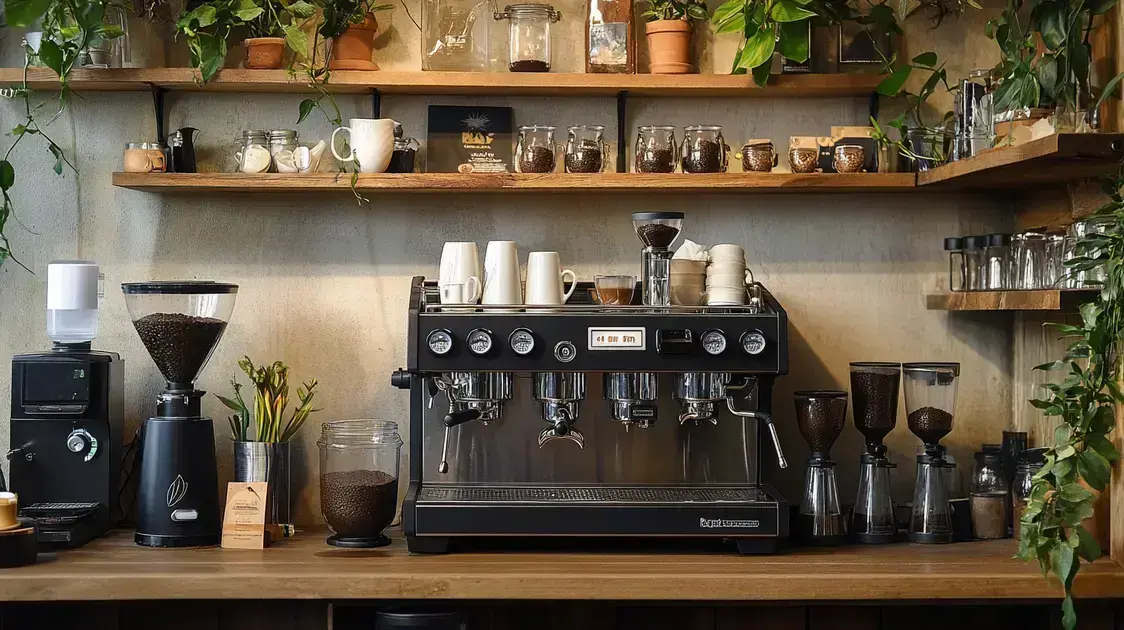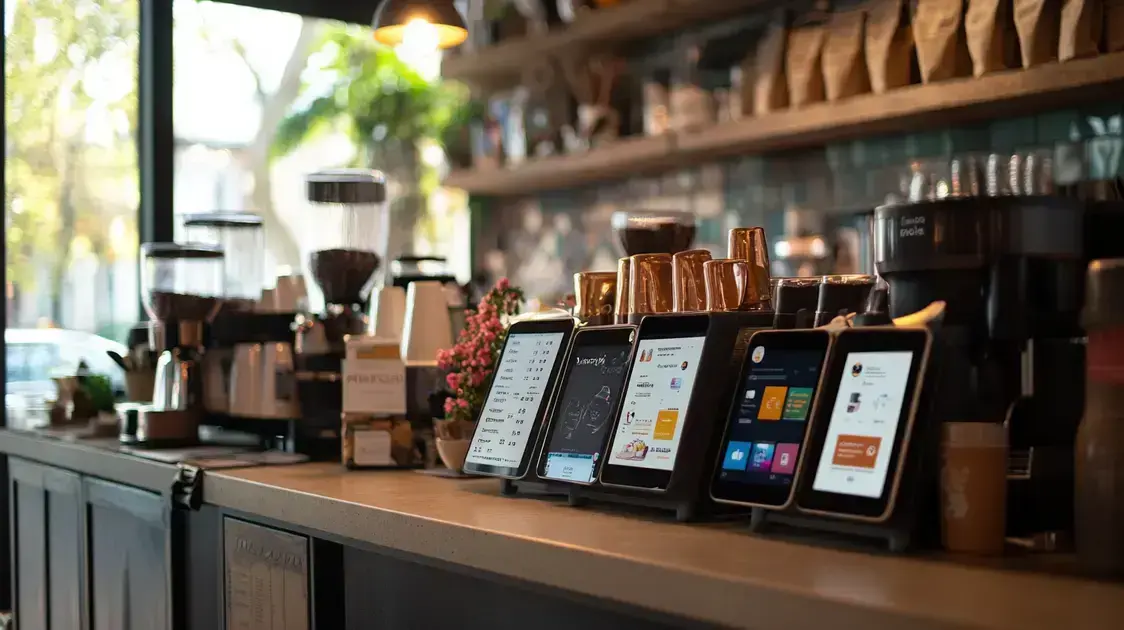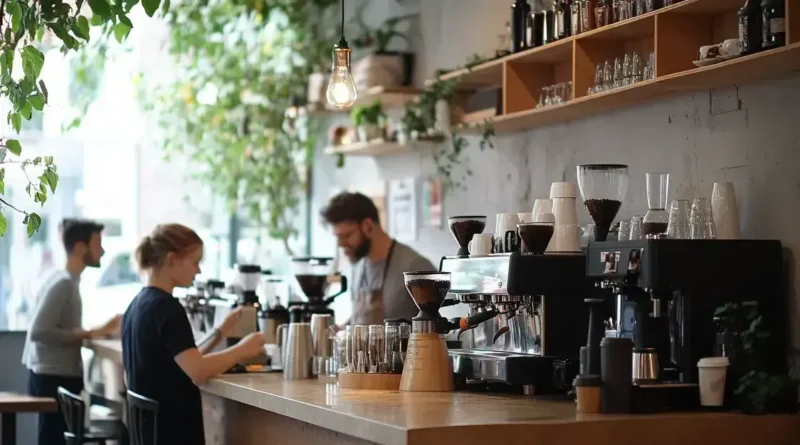Coffee Bar Business Plan: Your Blueprint for Success
A well-structured coffee bar business plan is crucial for aspiring café owners aiming to succeed in the bustling coffee industry.
By focusing on key elements like market research, financial projections, and operational strategies, you can navigate the competitive landscape effectively.
This article will guide you through creating an effective coffee bar business plan that not only attracts customers but also secures funding.
Understanding the Coffee Bar Concept
Understanding the coffee bar concept is essential for anyone looking to start a successful café. A coffee bar is more than just a place to enjoy a cup of coffee; it’s a space where people gather, socialize, and savor unique flavors.
To create a thriving coffee bar, you need to grasp the key elements that contribute to its charm and customer appeal.
Defining the Coffee Bar Experience
A coffee bar typically offers high-quality coffee beverages, a welcoming atmosphere, and sometimes, light snacks or baked goods. The goal is to provide customers with an experience that goes beyond just drinking coffee.
This means creating a warm ambiance, featuring comfortable seating, and possibly including art or music that resonates with your brand.
Creating a Unique Atmosphere
The ambiance of your coffee bar is crucial. Think about the decor, lighting, and even the background music that will set the tone. The right atmosphere encourages customers to linger longer, leading to increased sales.
A well-thought-out design can make your coffee bar a favorite local hangout, enhancing customer loyalty. Essas características devem ser consideradas no seu coffee bar business plan, garantindo que cada detalhe contribua para uma experiência memorável.
Differentiating Your Coffee Offerings
To stand out in a crowded market, you should consider offering unique coffee blends, specialty drinks, or locally sourced products. Exploring different brewing methods, like pour-over or cold brew, can also attract coffee enthusiasts.
Highlighting these offerings em seu coffee bar business plan ajudará a definir seu público-alvo e a criar estratégias eficazes para atrair clientes.
Understanding Customer Preferences
Successful coffee bars know their customer base. Conduct surveys or gather feedback to understand what your customers prefer.
Do they lean toward specialty coffee, or do they enjoy traditional options? Knowing your customers will guide your product offerings and marketing strategies.
Importance of Location
The location of your coffee bar plays a significant role in its success. Being situated in a busy area where foot traffic is high can maximize visibility and attract more customers. Additionally, consider proximity to businesses, schools, or parks where people often gather.
Emphasizing Community Engagement
Building a strong community presence can set your coffee bar apart. Host events, collaborate with local artists, or support community causes. This engagement fosters loyalty and encourages customers to think of your coffee bar as a second home.
In conclusion, understanding the coffee bar concept involves recognizing the unique experience it provides. By focusing on ambiance, customer preferences, and community ties, you’ll be well-equipped to build a successful coffee bar business.
Identifying Your Target Market

Identifying your target market is a critical step in creating a successful coffee bar business plan. Knowing who your customers are will help you tailor your offerings and marketing strategies effectively. Here are some steps to help you identify your target market.
Conduct Market Research
Start by analyzing your local area. Look at demographics such as age, income levels, and lifestyle. Are there students nearby? Young professionals? Families? Gathering this data will enable you to create a profile of your ideal customer.
Analyze Competitors
Investigating your competitors’ customer base can provide valuable insights. Visit other coffee bars in the area and observe their clientele. Take notes on what seems to attract customers, the type of products offered, and pricing strategies. This analysis will help pinpoint potential gaps in the market.
Surveys and Feedback
Engaging with potential customers directly through surveys or interviews can provide firsthand knowledge of their preferences. Ask what types of coffee they enjoy, what other items they would like to see, and how often they visit coffee bars.
Define Customer Segments
Once you have gathered enough information, it’s time to categorize your potential customers into segments like students, working professionals, or health-conscious individuals.
Each segment may have different preferences and motivations, which will assist you in crafting special promotions or coffee selections.
Incorporating this insight into your coffee bar business plan garantirá que suas estratégias atendam exatamente às necessidades do público-alvo.
Consider Trends and Lifestyle Changes
Stay informed about coffee trends and lifestyle changes that influence consumer behavior. For instance, the rise in remote work has increased demand for cozy coffee spaces where people can work comfortably. Adapting to these trends will make your coffee bar more appealing.
Create Customer Personas
Based on your research and data, develop customer personas that represent your target market. Include details about their age, interests, buying habits, and preferred coffee types. These personas will serve as guidelines for product development and marketing.
By thoroughly identifying your target market, you set a strong foundation for your coffee bar business plan. This knowledge will guide many facets of your business, from menu design to advertising efforts, ensuring you meet the needs of your desired clientele.
Crafting a Unique Selling Proposition
Crafting a unique selling proposition (USP) is essential for your coffee bar business plan. A USP defines what sets your coffee bar apart from competitors and helps attract customers. Here are key steps to develop an effective USP:
Identify Your Strengths
Begin by listing what makes your coffee bar special. Is it your premium coffee sourced from local roasters, unique coffee recipes, or a cozy atmosphere? Highlight these elements to form the backbone of your USP.
Understand Customer Needs
Consider what your target market desires. Customers often seek quality, convenience, and a memorable experience. Conducting surveys or talking to potential customers can uncover their preferences and pain points in existing coffee shops.
Analyze Competitors
Look at similar businesses to see how they position themselves. Identify gaps in their offerings that you can fill. For example, if competitors lack gluten-free or vegan options, that could be a strong point for your coffee bar.
Develop a Clear Message
Your USP should be clear and easy to communicate. It can be a tagline or a concise statement that encapsulates your coffee bar’s identity. For instance, “Handcrafted coffees from local beans, crafted with love” effectively conveys your focus on quality and community.
Test Your USP
Before fully committing to your USP, test it with your target audience. Gather feedback and see if it resonates. Make adjustments based on the input you receive to ensure it meets customer expectations.
Integrate Your USP into Marketing
Once established, weave your USP into all aspects of your marketing. Use it on your website, social media, and promotional materials. Reinforcing this message consistently will help build brand recognition and customer loyalty.
By crafting a unique selling proposition, você fortalece seu coffee bar business plan e garante que seu negócio se destaque em um mercado competitivo, atraindo os clientes ideais.
Essential Equipment for Your Coffee Bar

Essential equipment for your coffee bar plays a crucial role in delivering high-quality beverages and providing excellent service. Here are key items you will need to consider:
Espresso Machine
The heart of any coffee bar is the espresso machine. It allows you to create various espresso-based drinks like lattes and cappuccinos. Choose a reliable model with a good track record for quality and consistency.
Grinder
Invest in a quality coffee grinder. Freshly ground beans make a significant difference in taste. A burr grinder is ideal as it provides uniform grinds, essential for brewing the best coffee.
Brew Equipment
Depending on your menu, you might need additional brewing equipment, such as a pour-over stand, French press, or siphon brewer. Each offers unique flavors and brewing styles that you can provide to customers.
Blender
A high-performance blender is necessary if you plan to offer smoothies or blended coffee drinks. Look for a model that can handle ice and frozen ingredients without strain.
Water Filtration System
Clean water is crucial for great coffee. A water filtration system ensures you use pure water, free from contaminants that can affect flavor. This investment is vital for maintaining product quality.
Refrigeration Units
Keep your milk and other perishables fresh with adequate refrigeration. Display cases can also showcase baked goods or snacks, enhancing the overall offering at your coffee bar.
Point of Sale System
A reliable point of sale (POS) system helps process transactions efficiently. Look for software that allows for inventory management, sales tracking, and customer engagement features.
Having the right equipment is essential for any coffee bar to run smoothly and serve customers effectively. Investing in high-quality items will enhance the overall experience and quality of the products offered.
Creating a Financial Projection
Creating a financial projection for your coffee bar is a vital part of your business plan. This projection helps you plan for expenses, revenue, and profitability. Here are key components to include:
Estimate Start-Up Costs
Your first step is to determine the total start-up costs. These may include equipment purchases, renovations, initial inventory, and permits. Make a detailed list to ensure you cover all potential expenses.
Monthly Operating Expenses
Next, calculate your recurring monthly costs. These typically include rent, utilities, salaries, inventory, and marketing. Keep in mind seasonal variations that might influence these costs.
Sales Projections
Estimate your sales based on market research. Consider factors like location, target customer base, and competition. You can use industry averages to help guide your projections. For example, how many customers you expect daily can help you calculate expected revenue.
Break-Even Analysis
A break-even analysis shows when your coffee bar will start to make a profit. Determine how many sales you need each month to cover your costs. This information is crucial for financial planning.
Profit and Loss Statement
Prepare a projected profit and loss statement. This document summarizes revenue, costs, and expenses over a specific period. It helps visualize your expected profitability and informs decisions.
Cash Flow Projection
Your cash flow projection outlines when you expect money to come in and out of your business. This will help you manage cash flow effectively to avoid shortfalls and ensure ongoing operations.
Review and Adjust Regularly
Financial projections are not set in stone. Regularly review and adjust your projections as you gather data from your operations. This allows you to adapt to changes in your business environment and make informed decisions.
By creating an accurate financial projection, your coffee bar will be better prepared to face challenges and achieve long-term success.
Marketing Strategies for Your Coffee Bar

Marketing strategies for your coffee bar are essential to attract customers and grow your business. Incorporating these approaches into your coffee bar business plan will ensure long-term success. Here are several effective strategies to consider:
Social Media Marketing
Utilize platforms like Instagram, Facebook, and Twitter to showcase your coffee bar’s unique offerings. Share eye-catching photos of your drinks, promote special events, and engage with your customers through comments and messages.
Local SEO
Enhance your online presence by optimizing your website for local search. Use keywords like “coffee bar near me” or “best coffee shop in [your city]”. Create a Google My Business profile so customers can easily find your location and hours.
Promotions and Discounts
Offer promotions or loyalty programs to encourage repeat business. Create a “buy one, get one free” deal on certain days, or offer a loyalty card where customers get a free drink after a certain number of purchases.
Host Events
Organize events like open mic nights, art showcases, or coffee tasting sessions. These activities draw in crowds and can position your coffee bar as a community hub.
Collaborate with Local Businesses
Partner with nearby businesses for cross-promotions. For example, you can offer discounts to customers of a local bakery or a yoga studio nearby. This not only increases your visibility but also builds community relationships.
Email Marketing
Build an email list and regularly send out newsletters. Include updates about new menu items, upcoming events, and exclusive offers to keep your customers engaged and informed.
Content Marketing
Consider starting a blog on your website. Share articles related to coffee culture, brewing tips, or recipes. This positions your brand as an expert in the field and can attract more visitors to your coffee bar.
By integrating these strategies into your coffee bar business plan, you increase your business’s visibility, attract new customers, and build a loyal customer base.
Bringing Your Coffee Bar Dreams to Life
Launching a successful coffee bar requires thoughtful planning and execution. By understanding the coffee bar concept, identifying your target market, and crafting a unique selling proposition, you can build a strong foundation for your business.
Equipping your coffee bar with the right tools and following a solid financial projection will ensure you are well-prepared. Effective marketing strategies will attract customers, while operational planning and staff management will help you deliver excellent service.
With this comprehensive approach, your coffee bar can thrive in a competitive market, creating a vibrant space for coffee lovers and building a loyal customer base. Embrace the journey, and watch your coffee bar dreams become reality.
